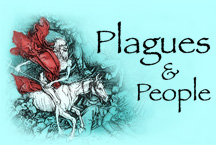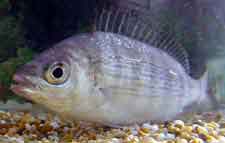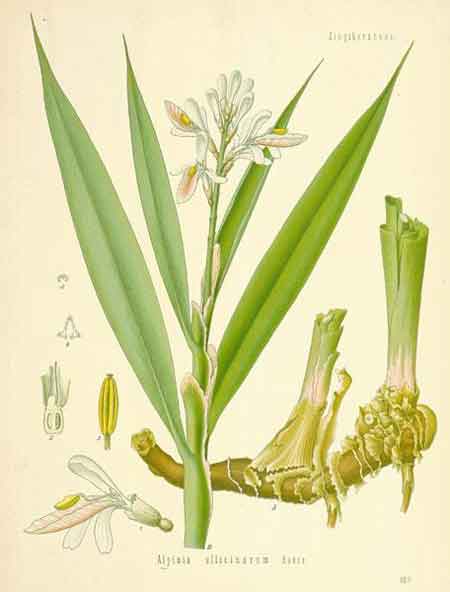THE Salerne Schoole doth by these lines impart
All health to England's King, and doth aduise
From care his head to keepe, from wrath his harte,
Drinke not much wine, sup light, and soone arise,
When meat is gone long sitting breedeth smart:
And after noone still waking keepe your eies.
When mou'd you find your selfe to nature's need,
Forbeare them not, for that much danger breeds,
Vse three physitians still; first doctor Quiet,
Next doctor Mery-man, and doctor Dyet. |
[Salerne Schoole—The first formal medical school in Europe was established by the end of the 9th c. in Salerno, Italy, a busy crossroads for world travelers. Medical advice was dispensed in the form of prescriptions which ultimately became the source for this useful compendium.] |
Rise early in the morne, and straight remember,
With water cold to wash your hands and eyes,
In gentle fashion retching euery member,
And to refresh your braine when as you rise,
In heat, in cold, in July, and December.
Both comb your head, and rub your teeth likewise:
If bled you haue, keepe coole, if bath'd, keepe warm,
If din'd, to stand or walke will do no harme
Three things preserve ye sight, glasse, grasse, and fountains:
At eue'n springs, at morning visit mountaines. |
|
If R be in the month, their iudgements erre,
That thinke that sleepe in afternoone is good,
If R be not therein, some men there are
That thinke a little nap breeds no ill blood,
But if you shall herein exceed too farre,
It hurts your health, it cannot be withstood:
Long sleepe at afternoones by stiring fumes,
Breeds Slowth, and Agewes, Aking heads and Rheums,
The Moysture bred in Breast, in Iawes and Nose,
Are cald Catarrs, or Tysique, or the Pose. |
[Tysique -- phthisis, literally "wasting disease", often synonymous with tuberculosis] |
Great harms haue growne, and maladies exceeding
By keeping in a little blast of wind,
So Cramps, and Dropsies, Collicks have their breeding,
And Mazed Braines for want of vent behind.
Besides we find in stories worth the reading,
A certaine Roman Emperor was so kind,
Claudius by name, he made a Proclamation,
A Scape to be no losse of reputation.
Great suppers do the stomacke much offend,
Sup light if quyet you to sleepe intend.
|
["XXXII. It is said, too, that [Claudius (10 BCE-54 CE)] intended to publish an edict, 'allowing to all people the liberty of giving vent at table to any distension occasioned by flatulence,' upon hearing of a person whose modesty, when under restraint, had nearly cost him his life." From "Tiberius Claudius Drusus Caesar" in Lives of the Twelve Caesars, by Suetonius.] |
To keepe good dyet, you should neuer feed,
Vntill you finde your stomacke cleane and voide,
Of former eaten meats, for they do breed
Repletion, and will cause you soone be cloid,
None other rule but appetite should need,
When from your mouth a moisture cleare doth void.
All Peares and Apples, Peaches, Milke and Cheese,
Salt meats, red Deere, Hare, Beefe and Goat: all these
Are meats that breed ill blood, and Melancholy,
If sicke you be, to feed on them were folly. |
|
Egges newly laid, are nutritiue to eat,
And rosted reare are easie to digest.
Fresh Gascoign wine is good to drink with meat
Broth strengthens nature aboue all the rest,
But broth prepar'd with flowre of finest wheate,
Well boyl'd, and full of fat for such are best.
The Priest's rule is (a Priest's rule shold be true,)
Those Egges are best, are long, and white, and new,
Remember eating new laid Egges and soft,
For euery Egge you eat you drinke as oft. |
[rosted reare -- roasted rare] |
Fine Manchet feeds to fat, Milke fills the vaines,
New Cheese doth nourish, so doth flesh of swine,
The Dowcets of some beasts, the marrow, brains,
And all sweet-tasting-flesh, and pleasant wine,
Soft Egges (a cleanly dish in house of Swains),
Ripe Figs and Raysins, late come from the Vine:
Chuse wine you meane shall serve you all the year,
Well-savour'd tasting well, and color'd cleere,
Fiue qualities there are, wine's praise aduancing,
Strong, beawtyfull, and fragrant, coole, and dancing. |
[Manchet -- bread made of fine wheat flour]
[Dowcets -- testicles] |
White Muskadell and Candy wine, and Greeke,
Do make men's wits and bodies grosse and fat;
Red wine doth make the voyce oft time to seek,
And hath a binding quality to that,
Canary and Madera, both are like
To make one leane indeed: (but wot you what),
Who say they make one leane, wold make one laffe
They meane, they make one leane upon a staffe.
Wine, women, baths, by art or nature warme,
Vs'd or abus'd do men much good or harme. |
[Candy -- in the Latin verse, the wine is described as "candida" which means clear, white, or sparkling]
[wot -- "I know", from the Old English verb witen, meaning "to know" in the sense of possessing wisdom; here the poet is passing on useful information]
|
Six things, that heere in order shall insue,
Against all poysons haue a secret poure,
Peares, Garlick, Reddish-roots, Nuts, Rape, and Rew,
But Garlicke chiefe; for they that it deuoure,
May drinke, and care not who their drink do brew
May walk in ayres infected euery houre:
Sith Garlicke then hath poure to saue from death,
Beare with it though it make unsauoury breath:
And scorne not Garlicke like to some that think
It onely makes men winke, and drinke, and stink. |
[Reddish-roots -- radishes] |
GARLICK (from Culpeper, pp. 57-58):
The offensivenes of the breath of him that hath eaten Garlick will leade you by the Nose to the knowledg hereof, and (instead of a description (direct you to the place wher it groweth in Gardens, which kinds are the best and most phisical.
Vertues and Use -- This was antiently accounted the Poormans Treacle, it beeing a remedy for all diseases or hurts (except those which it self breeds). It provoketh Urine and womens Courses, helpeth the biting of a Mad Dog and of other Venemous Creatures, killeth Worms in Children, cutteth and avoydeth tough flegm purgeth the head, helpeth the Lethargie, is a good preservative against, a remedy for any Plague sore, or foul Ulcer: taketh away spots and blemishes in the Skin, easeth pains of the eares ripeneth and breaketh Impostumes or other swellings: And for all these diseases the Onyons are also effectual; But the Garlick hath some more peculiar vertues besides the former: viz. It hath a speciall quality to discuss the inconveniences coming by corrupt Agues or Mineral Vapours or by drinking corrupt and stinking waters; as also by taking of Wolfbane, Henbane, Hemlock, or other poysonfull and dangerous herbs. It is also held good in Hydropick diseases, the Jaundice, falling-sickness, Cramps, Convulsions, the piles or Hemorrhoids or other cold diseases.
My Author quotes here many diseases this is good for, but conceals its vices: its heat is very vehement, and al vehement hot things send up but ill favor'd vapors to the brain; in chollerick men 'twil ad fuel to the fire, in men oppressed by melancholly t'wll attenuate the humor and send up strange fancies and as strange visions to the head, therfore let it be taken inwardly with great moderation, outwardly you may make more bold with it.... |
Though all ill sauours do not breed infection,
Yet sure infection commeth most by smelling,
Who smelleth still perfumed, his complexion
Is no perfumed by poet Martial's telling,
Yet for your lodging roomes giue this direction,
In houses where you mind to make your dwelling,
That nere the same there be no euil scents
Of puddle waters, or of excrements,
Let ayre be cleare and light, and free from faultes,
That come of secret passages and vaults. |
[Martial -- Spanish-born Roman poet, Marcus Valerius Martialis (c.38-103)] |
If wine haue over night a surfet brought,
A thing we wish to you should happen seeld:
Then early in the morning drinke a draught,
And that a kind of remedy shall yeeld,
But gainst all surfets, vertue's schoole hath taught,
To make the gift of temperance a sheeld:
The better wines do breed the better humours,
The worse, are causes of vnwholesome tumors:
In measure drinke, let wine be ripe, not thicke,
But cleere and well alaid, and fresh, and quicke.
|
[seeld -- seldom] |
The like aduice we give you for your beere,
We will it be not soure, and yet be stale,
Well boyl'd, of harty graine and old, and cleare,
Nor drinke too much, nor let it be too stale:
And as there be foure seasons in the yeare,
In each a seuerall order keepe you shall.
In Spring, your dinner must not much exceed,
In Summer's heat, but little meat shall need:
In Autumne, ware you eat not too much fruit,
With Winter's cold, full meats do fittest sute. |
|
If in your drinke you mingle Rew with Sage,
All poyson is expel'd by power of those,
And if you would withal lust's heat asswage,
Adde to them two the gentle floure of Rose.
Who would not be Sea-sice when seas do rage,
Sage-water drinke with wine before he goes.
Salt, Garlicke, Parsely, Pepper, Sage, and Wine,
Make sawces for all meats both coarse and fine,
Of washing of your hands much good doth ryse,
Tis wholesome, cleanly, and releeues your eyes. |
|
Eate not your bread too stale, nor eat it hot,
A little leuen'd, hollow-bak't and light:
Not fresh, of purest grain that can be go,.
The crust breeds choller both of brown and white,
Yet let it be well bak't or eat it not,
How ere your tast therein may take delight.
Porke without wine it not so good to eate
As Sheepe with wine, it medicine is and meate,
Tho intrayles of a beast be not the best,
Yet are some intrayles better than the rest. |
[leuen'd -- leavened] |
Some loue to drinke new wine not fully fin'd,
But for your health we wish that you drinke none,
For such to dangerous fluxes are inclin'd,
Besides, the lees of wine doth breed the stone.
Some to drinke onely water are assign'd:
But such by our consent shall drinke alone,
For water and small beere we make no question,
Are enemies to health and good digestion:
And Horace in a verse of his rehearses,
That Water-drinkers neuer make good verses. |
[XIX. TO MAECENAS.
If truth there be in old Cratinus' song,
No verse, you know, Maecenas, can live long
Writ by a water-drinker....
The Epistles by Quintus Horatius Flaccus (65-8 BCE)] |
The choyse of meats to health doth much auayle,
First Veale is wholsome meat, and breeds good blood,
So Capon, Hen, and Chicken, Partridge, Quaile,
The Phesant, Woodcock, Lark, and Thrush be good,
The Heath-cock wholsome is, the Dove, the Raile,
And all that do not much delight in mud:
Fair swans, such loue your beauties make me bear you,
That in the dish I easily could forbeare you.
Good sport it is to see a Mallard kil'd,
But with their flesh, your flesh should not be fil'd. |
|
As choyce you make of Fowle, so make of Fish,
If so that kind be soft, the great be best,
If firme, then small, and many in a dish:
I need not name, all kinds are in request,
Pyke, Trowt, and Pearch, from water fresh I wish,
From sea, Bace, Mullet, Brean, and Soules are best:
The Pyke a rauening tyrant is in water,
Yet he on land good meat yeelds neare the later.
If Eeles and Cheese you eat, they make you hoarse,
But drinke apace thereto, and then no force. |
[Brean -- Sea Bream;
food fish of the family Sparidae or Bramidae] |
Some loue at meals to drink small draughts and oft,
But fancie may heerein and custome guid,
If egges you eate, they must be new and soft,
In peaze good qualities, and bad are tryed,
To take them with the skin that growes aloft,
They windie be, but good without their hide.
In great consumptions learn'd physitians thinke,
'Tis good a Goat or Camel's milke to drinke,
Cowe's milke and Sheepes do well, but yet an Ass's,
Is best of all, and all the other passes. |
|
Milke is for Agewes and for Headache naught,
Yet if some ague's fit you feel you free,
Sweet-butter wholsome is, as some haue taught,
To cleanse and purge some paines that inward be:
Whay, though it be contemn'd, yet it is thought,
To scoure, and clense, and purge in due degree:
For healthy men may cheese be wholsome food,
But for the weake and sickly 'tis not good,
Cheese is an heauie meat, and grosse, and cold
And breedeth costiuenesse both new and old. |
[costiueness -- costiveness; constipation] |
Cheese makes complaint that men on wrong suspitions
Do slander it, and say it doth such harme,
That they conceale his many good conditions,
How oft it helpes a stomacke cold to warme,
How fasting tis prescrib'd by some physitians,
To those to whom the flux doth giue alare:
We see the better sort thereof doth eate,
To make as twere a period of their meat,
The poorer sort when other meat is scant,
For hunger eate it to releeue their want. |
|
Although you may drinke often while you dine,
Yet after dinner touch not once the cup,
I know that some physitians do assigne
To take some liquor straight before they sup:
But whether this be meant by broth or wine,
A controuersie 'tis not yet tane vp:
To close your stomacke well, this order sutes,
Cheese after Flesh, Nuts after Fish or Fruits.
Yet some haue said, (beleeue them as you will),
One Nut doth good, two hurt, the third doth kill. |
[tane -- taken] |
Some Nut, gainst poyson is preseruatiue;
Peares wanting wine, are poyson from the tree,
But bak't Peares counted are restoratiue,
Raw Peares a poyson, bak't a medicine be:
Bak't Peares a weak-dead-stomacke do reuiue,
Raw Peares are heauy to digest we see,
Drinke after Peares, take after Apples order
To haue a place to purge your selfe of ordure.
Ripe Cherries breed good blood, and help the stone,
If Cherry you do eat and Cherry-stone. |
|
Coole Damsens are, and good for health by reason
They make your intrayles soluble and slacke,
Let Peaches steepe in wine of newest season,
Nuts hurt their teeth, yt with their teeth they cracke,
With euery 'Nut tis good to eate a Reason,
For though they hurt the splene they help the back:
A plaister made of Figges by some men's telling,
Is good against all kirnels, boyles, and swelling,
With Poppy ioyn'd, it drawes out bones are broken,
By Figs are lice engendred, Lust provoken. |
[Damsens -- plums]
[Reason -- raisin] |
Eate Medlars, if you haue a looseness gotten,
They bind, and yet your vrine they augment,
They haue one name more fit to be forgotten,
While hard and sound they be, they be not spent,
Good Medlars are not ripe till seeming rotten,
For meddling much with Medlars some are shent.
New Rhennish-wine stirs vrine, doeth not binde,
But rather loose the belly, breeding wind,
Ale humours breeds, it addes both flesh and force,
Tis loosing, coole, and vrine doth inforce. |
|
| THE MEDLAR (from Culpeper, p. 80):
This Tree groweth neer the bigness of the Quince Tree, spreading Branches reasonable large, with longer and narrower Leaves than either the Apple or Quince, and not dented about the edges: At the end of the Sprigs stand the Flowers made of Five white, great broad pointed Leavs, nicked in the middle, with some white threds also: after which cometh the Fruit, of a brownish green colour, being ripe, bearing a Crown as it were on the top, which were the five green leaves; and being rubbed off or fallen away, the head of the Fruit is seen to be somwhat hollow. The Fruit is very harsh before it be mellowed, and hath usually five hard Kernels within it.
There is another kind hereof differing nothing from the former, but that it hath some Thorns on it in several places, which the other hath not, and the Fruit is smal and not so pleasant....
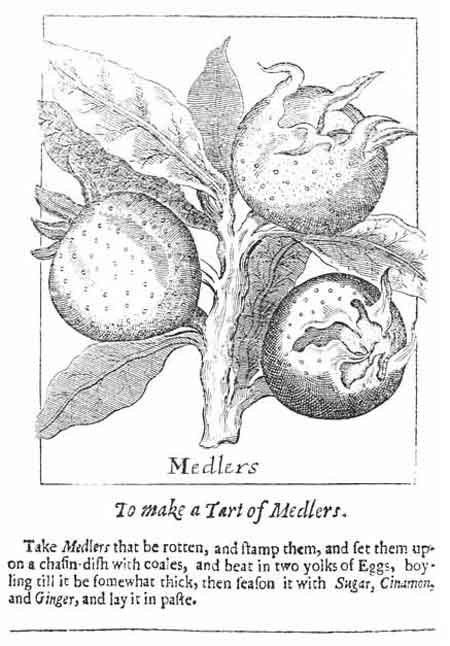
Vertues and Use -- They are very powerful to stay any Fluxes of Blood or Humors in Man or Woman: the Leavs have also the like quality. The Fruit eaten by Women with Child, stayeth their longings after unusual meats, and is very effectual for them that are apt to miscarrry, and be delivered before their time, to help that malady, and make them joyful Mothers. The Decoction of them is good to gargle and wash the Mouth, Throat and Teeth, when there is any defluxion of Blood to stay it, or of Humors, which causeth Pains and Swellings: It is a good bath for Women to sit over that have their Courses flow too abundantly; or for the Piles when they bleed too much. If a Pultis or Plaister be made with dried Medlars beaten and mixed with the Juyce of red Roses, whereunto a few Cloves and Nutmeg may be added, and a little red Correl also, and applied to the Stomach that is given to casting, or loathing of meat, it effectually helpeth. The dried Leavs in Pouder, strewed on fresh, bleeding Wounds, restraineth the Blood, and healeth up the Wound quickly: The Medlar stones made into Pouder and drunk in Wine, wherein some Parsley Roots have bien infused all night, or a little boyled, do break the Stone in the Kidneys, helping to expel it.
The Fruit is old Saturns, and sure a better Medicine he hardly hath to strengthen the retentive faculty; therfore it staies Womens Longings, the good old Man cannot endure Womens minds should run a gadding: Also a Plaister made of the Fruit dried before they be rotten, and other convenient things, and applied to the Reins of the Back, stops Miscarriage in Women with Child. |
Sharpe vineger doth coole, withall it dries,
And giues to some ill humour good correction:
It makes one melancholy, hurts their eyes,
Not making fat, nor mending their complection:
It lessens sperm, makes appetite to rise:
Both taste and scent is good against infection.
The Turnep hurts the stomacke, wind it breedeth
Stirs vrine, hurts his teeth thereon that feedeth:
Who much thereof will feed, may wish our nation
Would well allow of Claudius' proclamation. |
|
It follows now what part of euery beast
Is good to eate: first know the heart is ill,
It is both hard and heauy to disgest,
The Tripe, with no good iuyce our flesh doth fill:
The Lites, are light, yet but in small request:
But outer parts are best in Physicke's skill.
If any braines be good, (which is a question),
Hennes braine is best, and lightest of digestion:
In Fennell-seed, this vertue you shall find,
Forth of your lower parts to drive the wind. |
[Tripe -- beef stomach]
[Lites -- lungs] |
Of Fennell vertues foure they doe recite,
First, it hath power some poysons to expell,
Next burning Agues it will put to flight,
The stomacke it doth cleanse, and comfort well:
And fourthly it doth keepe, and cleanse the sight,
And thus the seed and herbe doth both excell.
Yet for the two last told; if any seede
With Fennell may compare, tis Annis-seed:
Some Anny seeds be sweet, and some more bitter,
For pleasure these, for medicine those are fitter. |
|
| FENNEL (from Culpeper, p. 57):
Every Garden affordeth this so plentifully, that it needeth no Description.
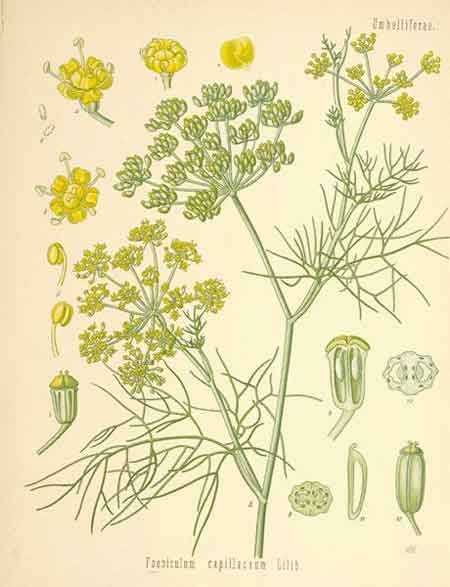
Vertues and Use -- Fennel is good to break wind, to provoke Urine, and eas the pains of the Stone, and help to break it. The Leavs or Seed boiled in Barley Water and drunk is good for Nurses to encreas their Milk and make it more wholsom for the Child: The Leavs, or rather the Seed boyled in Water staieth the Hiccough, and taketh away that loathing which oftentimes hapneth to the Stomachs of Sick, and Feaverish Persons, and allayeth the heat therof. The Seed boyled in Wine and drunk, is good for those that are bitten by Serpents, or have eaten Poyson full Herbs or Mushroms: The Seed and the Root much more helpeth to open Obstructions of the Liver, Spleen, and Gall, and thereby helpeth the painful and windy swellings of the Spleen, and the yellow Jaundice, as also the Gout and Cramps. The Seed is of good use in Medicines to help shortness of breath, and Wheesing by stopping of the Lungs. It helpeth also to bring down the Courses and to clens the parts after delivery....
The Roots are of most use in Physick Drinks and Broths that are taken to clens the Blood, to open Obstructions of the Liver to provoke Urine, and amend the ill colour in the Face after Sickness, and to caus a good habit through the Body: Both Leavs, Seeds, and Roots hereof are much used in Drinks or Broths, to make people more spare and lean that are too fat. The distilled Water of the whol Herb or the condensate Juyce dissolved, but especially the Natural Juyce that in hot Countries issueth out thereof of its own accord, dropped into the Eyes, clenseth them from mists and films that hinder the sight. The sweet Fennel is much weaker in Physical uses, than the common Fennel. The wild Fennel is stronger and hotter than the tame; and therefore most powerful against the Stone, but not so effectual to encreas Milk, because of its driness.
One good old fashion is not yet quite left off, viz. To boil Fennel with Fish, for it consumes that Flegmatick humor which Fish most plentifully afford and annoy the body by, therefore it is a most fit Herb for that purpose though few that use it know why or wherfore they do it, I suppose the Reason of its benefit this way is becaus it is an Herb of Mercury and under Virgo, and therfore bears Antipathy to Pisces. Dill is also an Herb of Mercury, which I forgot to certifie you of before. |
Dame Nature's reason, far surmounts our reading,
We feele effects, the causes oft vnknowne,
Who knows ye cause why Spodium stancheth bleeding,
( Spodium, but ashes of an ox's bone).
We learne herein to praise His power exceeding,
That vertue gave to wood, to herbes, to stone.
The Liuer Spodium, Mace the heart delightes,
The braine likes Muske, and Lycoras the Lites;
The spleen is thought much comforted with Capers.
In stomacke, Gallingale allayes ill vapors. |
[Spodium -- charcoal made from animal bones]
[Lycoras -- licorice]
[Gallingale -- galangal; aromatic plant of the ginger family (see image below)] |
|
Sawce would be set with meate vpon the table,
Salt is good sawce, and had with great facility:
Salt makes vnsavoury vyands manducable,
To driue some poysons out, Salt halth ability,
Yet things too salt are nere commendable:
They hurt the sight, in nature cause debility,
The scab and itch on them are euer breeding,
The which on meats too salt are often feeding:
Salt should be first remou'd, and first set downe,
At table of the knight, and of the clowne. |
[manducable -- chewable] |
As tastes are diuers, so Physitians hold
They haue as sundry qualities and power,
Some burning are, some temperate, some cold,
Cold are these three, the tart, the sharpe, the sour,
Salt, bitter, biting, burne as hath been told,
Sweet, fat and fresh, are temperate euery houre.
Foure special vertues hath a sop in wine,
It maketh the teeth white, it cleares the eyne,
It addes vnto an empty stomack fulness,
And from a stomacke fill'd, it takes the dulness. |
|
If to an vse you haue your selfe betaken,
Of any diet, make no sudden change,
A custome is not easily forsaken,
Yea though it better were, yet seemes it strange,
Long vse is as a second nature taken.
With nature custome walkes in equal range.
Good dyet is a perfect way of curing,
And worthy much regard and health assuring,
A King that cannot rule him in his dyet,
Will hardly rule his Realme in peace and quyet. |
|
They that in Physicke will prescribe you food,
Six things must note we here in order touch,
First what it is: and then, for what tis good,
And when; and where; how often; and how much,
Who note not this, it cannot be withstood,
They hurt, not heale, yet are too many such.
Coleworts broth doth loose, the substance bind,
Thus play they, fast and loose, and all behind.
But yet if at one time you take them both,
The subtance shall giue place vnto the broth. |
|
| CABBAGES and COLEWORTS (from Culpeper, pp. 25-26):
I shal spare a labor in writing a Description of these, sith almost every one that can but write at all may describe them from his own knowledg, they being generally so well know that Descriptions are altogether needless.
Vertues and Use -- The Cabbages or Coleworts boyled gently in Broth and eaten do open the Body, but the second Decoction doth bind the Body. The Juyce therof drunk in Wine helpeth those that are bitten by an Adder, and the Decoction of the Flowers bringeth down Womens Courses. Being taken with Honey, it recovereth hoarsness or loss of the voice. The often eating of them wel boyled, helpeth those that are entring into a Consumption. The Pulp of the middle Ribs of Coleworts boyled in Almond Milk, and made up into an Electuary with Honey, being taken often, is very profitable for those that are pursie and short-winded. Being boyled twice, and a old Cock boyled in the Broth and drunk, it helpeth the pains and obstructions of the Liver and Spleen, and the Stone in the Kidnies. The Juyce boyled with Honey and dropped into the corner of the Eye, cleareth the sight, by consuming any Film or cloud begining to dim it; it also consumeth the Canker growing therin. They are much commended being eaten before meat, to keep one from surfetting, as also from being drunk with too much Wine, or quickly make a man sober again that is drunk before. For (as they say) there is such an Antipathy or enmity between the Vine and the Colewort, that the one will die where the other groweth. The Decoction of Colworts taketh away the pain and ach, and allayeth the swellings of swoln and gouty Legs and Knees, wherein many gross and watry humors are fallen, the place being bathed therwith warm: It helpeth also old and filthy sores, being washed therewith, and healeth all smal Scabs, Pushes and Wheals that break out in the Skin. The Ashes of Colwort Stalks mixed with old Hogs-Grease are very effectual to annoint the Sides of those that have had long pains therin, or any other place pained with Melancholly and windy humors.
This was surely Chrysippus his god, and therfore he wrote a whol Volumn of them and their Vertues, and that none of the least neither, for he would be no smal Fool, he apropriates them to every part of the Body, and to every Disease in every part, and honest old Cato they say used no other Physick, I know not what Mettals their Bodies were made of, this I am sure, Cabbages are extream windy whether you take them as Meat, or as Medicine, yea as windy Meat as can be eaten, unless you eat Bagpipes or Bellows, and they are but seldom eaten in our daies, and Colewort Flowers are somthing more tollerable, and the wholsomer Food of the two.... |
